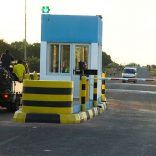Mozambique: Closure of offices - Renamo calls on members to respect internal bodies
Election candidates must deliver papers in July

Map: DW
Candidates for Mozambique’s parliamentary and provincial elections will have almost the entire month of July to deliver their nomination papers.
Speaking at a Maputo press conference on Thursday, the spokesperson for the National Elections Commission (CNE), Paulo Cuinica, said that parties proposing parliamentary candidates should deliver their nomination papers to the CNE during normal working hours (07.30 to 15.30) on weekdays from 2 July to 1 August.
The nominations for candidates for the provincial assemblies should be delivered on the same dates to the provincial elections commissions.
Parliamentary candidates must present an authenticated copy of their identity card or birth certificate, and proof that they are registered voters with a clean criminal record. For the provincial assembly elections, the candidates must also prove that they live in the province for which they are standing.
All candidates must present a declaration that they are eligible to stand and that they accept nomination.
The electoral law envisages a contribution from the state budget to the election campaigns of the parties running in both parliamentary and provincial elections. Cuinica said the CNE does not yet know how much money will be available, and how it will be distributed.
Asked whether the CNE will go on throwing money at tiny parties which only obtained a derisory number of votes in the last general elections (in 2014), Cuinica claimed that the CNE’s hands were tied by the law, and it must give funding to all parties standing.
Only when the law is changed, he said, would the CNE be able to disqualify parties with no proven popular support. No fewer than 18 of the 39 parties registered with CNE scored less than one per cent of the vote in 2014. Several scored less than 0.1 per cent. Yet taxpayers’ money will continue to pour into their pockets.
Asked about mathematical impossibilities in the recent voter registration, Cuinica said he could not comment, because the CNE has not yet received the definitive data on the registration from its executive body, the Electoral Administration Technical Secretariat (STAE).
The STAE figures distributed a few days after the close of registration on 30 May contain one glaring absurdity.
STAE claims that the number of voters registered in the southern province of Gaza is 1.14 million.
Yet the total population of Gaza, according to the 2017 census, is only 1.42 million. Adjusted by the average population growth rate of 2.8 per cent a year, in 2019 there can, at most, be 1.5 million people in Gaza.
Throughout the country, the majority of the population is under the voting age of 18. The median age of the population is 16.6 years. So the total number of people in Gaza aged 18 and above is less than 750,000.
A Gaza electorate of 1.14 million is thus statistically impossible. It means that the Gaza electorate has been inflated by at least 390,000. (The alternative explanation would be that the census is wildly wrong – but this seems most unlikely, given the high regard the National Statistics Institute, the INE, has enjoyed thanks to the professionalism of its work).
The figures are important because the seats in the Mozambican parliament are allocated to the provinces in proportion to their registered electorate. Unless the impossible Gaza figure is corrected, Gaza will be seriously over-represented in the Assembly.













Leave a Reply
Be the First to Comment!
You must be logged in to post a comment.
You must be logged in to post a comment.